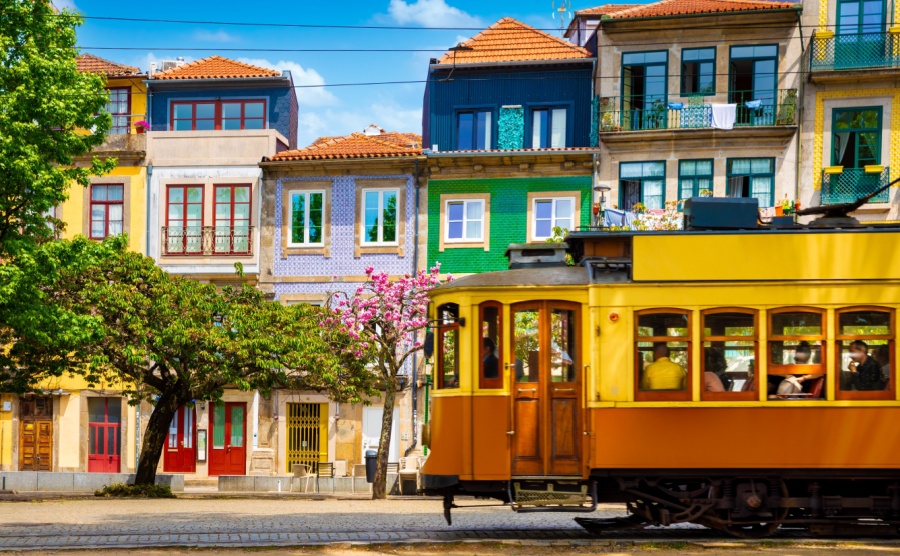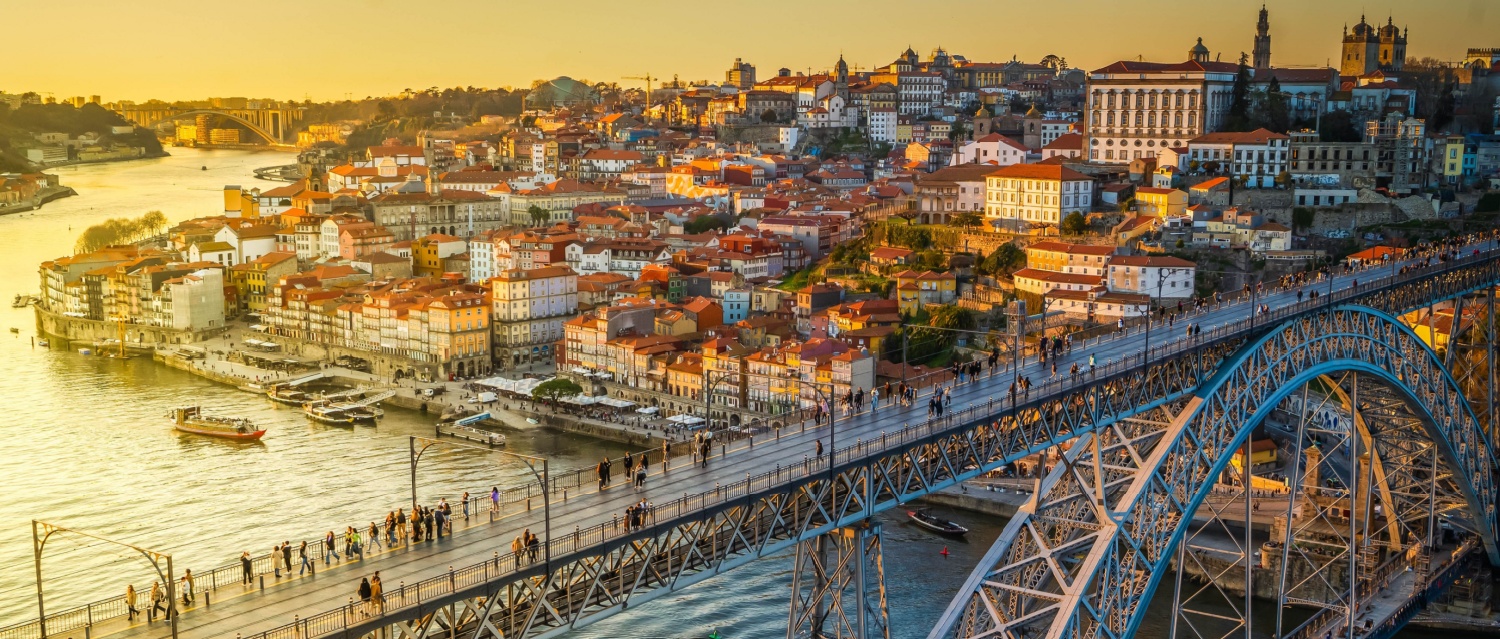Wine will always be integral to northern Portugal’s identity but these days the verdant region’s appeal is far more diverse. Historical gems Porto and Braga combine a quality lifestyle with exciting real estate and dynamic economies, especially in the digital sector.
For international investors and relocators, these two cities are a refreshing alternative to pricier Lisbon and the more touristy resorts of the Algarve.
Northern Portugal has long been known to the UK and wider world for its vineyards along the picturesque Douro Valley and most famous export – port wine. But in recent years international investors have been looking to the city of Porto (also known as Oporto) and increasingly its smaller neighbour Braga for more than a heady tipple or weekend break, with the two destinations attracting increasing numbers of foreign second homeowners, entrepreneurs and relocating families.
Porto’s cultural diversity and vibrancy are key drivers behind rising international interest – and more than make up for its wetter, cooler climate compared to southern Portugal. As the country’s second city after Lisbon, its foreign population has more than doubled in the past five years. The Porto Metropolitan Area is now home to more than 69,000 international residents (Portuguese Chamber of Commerce 2025). Around a third of those live within the city itself, which has a total population of 231,800.
“Porto delivers a charming blend of historic architecture, gastronomic delights and contemporary dynamism,” said Christina Hippisley, General Manager of the Portuguese Chamber of Commerce in the UK recently. “It’s a winning combination for entrepreneurs looking to relocate from the UK, with an impressive digital economy and a laidback, family-friendly lifestyle that is a hit with expats of all ages.”

Porto is renowned for its colourful homes
Investment-friendly economies
Efforts to attract investment and foreign entrepreneurs to this corner of Portugal are not going unnoticed.
Earlier this year Porto was ranked number one ‘large city’ in Europe for foreign direct investment strategy, according to think tank fDi Intelligence’s (part of Financial Times) European Cities and Regions of the Future 2025 report. This is the fourth consecutive year that Porto has been included in the rankings.
Keen not to be left behind, Braga, 60 kilometres north of Porto, was ranked second in the ‘small city’ category by fDi Intelligence.
The latest fDi report described Porto as “a major hotbed for talent in science, technology, engineering and maths with more than 300 tech start-ups” and as “an emerging hub for innovative, digital business in Europe”.
Software projects dominate investment into Porto, with more than half of these investing in research and development. The city’s investment promotion agency InvestPorto was commended highly for driving activity.
The Porto Metropolitan Area accounts for 16.2% of Portugal’s gross domestic profit (GDP). Job creation rates are tracking the city’s increasing economic prominence. An estimated 28,000 jobs have resulted recently through €2billion worth of recent InvestPorto backed foreign direct investment projects. The lifestyle and working environment are deemed especially suited to foreign digital nomads, as well a real estate investors.
Elsewhere, Braga’s efforts to become a leading innovator in technology solutions around the city and cultivate an innovation ecosystem are paying off. The city was named ‘European Rising Innovative City’ at the iCapital Awards, part of the internationally acclaimed Web Summit held in Lisbon in November 2024.

Not as well known as Lisbon and Porto, Braga is fast becoming a major city
Real estate – urban, beach and riverfront
Porto’s economic success is reflected in demand for homes in the city. Confidencial Imobiliário reports that the city saw a 7.8% year-on-year jump in house prices during Q4 2024, while the number of dwellings sold jumped 19% from 2023 to hit 6,800 units in 2024.
In Porto, central areas include cosmopolitan and modern Boavista, historic Ribeira, upmarket Foz do Douro with sea views and the hip Cedofeita district. Across the Douro River is the city of Vila Nova de Gaia (or just Gaia), a historic hub for Portugal’s wine industry with a lively riverfront and access to beautiful beaches. On the northern edge of Porto is Vila do Condo, once a ship-building town but now a charming seaside resort popular with Portuguese people.
Luxury developers targeting the overseas market in and around Porto include Nomad Capital, who recently launched their Nomad Eden project in the popular Foz area of Porto. Another is BSA Investments, whose Douro Living project comprises eight houses built in a minimalist, modern design to maximise the area’s sunlight and views over the stunning Douro River. The homes enable families to enjoy country calm while being only 30 minutes from Porto.

Shop at the Bolhao market stalls in Porto
The lifestyle
The quality of life in both Porto and Braga is both high and affordable. With safe, welcoming communities and year-round cultural festivities, they each offer access to excellent healthcare and modern amenities, including excellent internet speeds, without losing any of their traditional charm.
Food and wine are world-class and both cities’ foodie scene is gaining prominence every year. This year Portugal earned eight new Michelin star restaurants, bringing its total of 1-star restaurants to 38. Four of the newly crowned eateries include restaurants in Porto and its metropolitan area (Vila do Condo and Vila Nova de Gaia) and Braga. Three of Portugal’s eight restaurants with two stars are in Porto and the neighbouring areas of Leça da Palmeira and Vila Nova de Gaia.

Porto could be your gateway into Europe
Travelling there
Porto’s international airport has direct flights around Europe. The UK is a 2.5-hour flight away. For those who prefer to avoid flying, Porto is a six-to-seven-hour drive from the Spanish ports of Santander and Bilbao, both of which offer regular, direct ferry services to the UK.
Travelling sustainably is a priority for many Porto residents. The city is recognised as a global leader in terms of climate action and transparency, aiming to reach net zero emissions by 2030 – a full 20 years ahead of the EU’s target. By 2020, it had already reduced emissions by 57% compared to 2004 levels, with further significant work planned as part of the Porto Climate Pact.





